- Home
- Ellen Datlow
The Dark Page 24
The Dark Read online
Page 24
“I’ve got my parents’ evening at school,” my father tells me. “I’ll try not to be too late. You won’t mind being on your own, will you?”
“There’s nothing round here to be scared of,” my mother says. “You aren’t a woman living by herself.”
I know she means most of her students, but I feel as if she’s talking about Mrs Hammond. I don’t want to remember how being alone in her house filled Mrs Hammond up with fear. I pretend I don’t mind being left by myself at night. I keep on trying to pretend once my parents leave.
I spend all the time I can at washing up the dinner things till the window shows me it’ll soon be dark. I start watching television, but there’s nothing on that can reach inside my head. Running through the channels twice makes me feel I’m trying to be like Brad, and I think how my mother would blame me but not him. I know I ought to be doing my homework, though when so many people at my school don’t, sometimes I wonder why I should. My mother would make me feel guilty for wasting my advantages, that’s mostly why. There’s no reason for me to be scared of going in my room.
I switch on the light and the one on my desk as well before I take my books out of my bag and shut Mrs Hammond’s album in it. Even when I turn the computer on I feel there isn’t enough light in the room. Outside the window it looks as if the dark is spreading out of the black place where Mrs Hammond used to live. When I start thinking the blackness or something in it wants to get hold of me I pull the curtains together.
For history we have to write what it was like to live in England in the years leading up to the Second World War. I take everything I can find in my schoolbooks and type it on the screen, but it doesn’t feel as if it was ever alive. Mrs Hammond would have been about my age at the beginning of the thirties, and I try to think if she told me about them. I can’t remember anything she said, but my thoughts seem to start using her voice. I keep thinking I ought to look in her album.
I’m not sure I want to while I’m by myself, even if it helps me do the kind of homework my mother always says I can. I do my best to let the stuff I’ve copied tell me more to write, but trying makes the inside of my head feel as if it’s turning black. I almost type the only thing that’s in there, which is “See my pictures,” even if it sounds like Mrs Hammond’s voice that’s left its mouth somewhere. I don’t want to hear it. I jump up and pull the album out and put it on my desk.
It falls open, and a photograph tries to stand up. It’s the one I found crumpled on the floor, which must be why it’s moving, only it looks as if someone’s trying to get hold of it without much of a hand. I squash it between the cover and the first cardboardy page, which doesn’t have strips cut out of it to hold photographs. I wish I’d shut the album instead, because I don’t like the look of any of the photographs at all.
They’re in the order of how old Mrs Hammond was. The baby ones are nearly black like fruit that’s shrunk—all you can see are little eyes trying to peer out of the blackness. I start hoping they’ve all gone like that, because the bits of her as a girl that the blackness hasn’t covered up look so thin I think it’s taken their flesh off. But those aren’t as bad as the ones where she’s grown up. Maybe the blackness is some kind of mould, because the parts of her it’s left white look swollen like toadstools that burst if you poke them. I get as far as a picture of her and Mr Hammond with their eyes staring out of two fat raw white blobs. I shut the album tight, which feels as if I’m not squashing only pictures. I don’t want it in my room.
I don’t even want it in the house, not when it’s keeping Mrs Hammond’s voice inside my head. “See the rest,” I think she’s pleading. “See all of me.” I’d leave the album outside and wait till tomorrow to think what to do if I wasn’t afraid it might rain. I find three plastic bags in a kitchen cupboard and put the album inside one and the others too. There’s a wind, and if I leave the album behind the house my parents may hear the plastic rustling and find out what it is. I hurry out the front instead, across the road.
Half Mrs Hammond’s front door is lying on its back beyond some coaly bricks. Bits of burnt wood flake off and grit under my nails when I lift the door enough to slide the album under. Tomorrow I’ll pretend to find the album on my way to school and give it to my parents to pass on to Mrs Hammond’s son. I try to imagine her voice being muffled by the door when I drop it, except that’s like imagining her trapped in her coffin, not able to see. The wind stirs up the patch where she lived, and the choking smell feels as if the dark is rising up to wall me in. I dash across the road into not enough light, but I’m only at the gate when I hear our phone ringing.
I have to get the key out of my pocket and push it in the lock the right way up and turn it, and all the while I’m afraid the phone will stop or won’t. I shut the dark out and run to grab the phone out of its plastic nest on the wall. “Hello?” I call louder than the voice in my head.
“Are you there at last? I was starting to think you were doing a Brad. Don’t tell Willa I said that. Were you asleep?”
“Not yet.”
“Glad I didn’t wake you, then, but time for bed all the same. I’m just in discussion with some colleagues.”
I can hear the kind they’re having and the other noises of the pub. “Will you be home soon?” I plead.
“Not while you’re conscious, I shouldn’t think. I do need to relax occasionally, you know. Just get your head on the pillow and before you know it you’ll be gone. Willa and her women may have got themselves some strength, but that doesn’t have to mean they’ve taken ours away.” I don’t think he meant me to hear the last part, or maybe he doesn’t care. “See you in the morning, Jeremy,” he says.
I ram the phone into its nest and run upstairs to the bathroom. I stay in there till I realise I’m staring at my face in the mirror. That reminds me how Mrs Hammond couldn’t look in one. I’m afraid something like her face will wobble up over the edge, trying to see me instead of itself. I’d rather be in my room than think about that, and I dash across the landing.
There’s too much of a mirror in my room. I keep my back to it while I undress for bed and hurry to the switch by the door. I turn the light off and on again at once. I’ve never seen my room so dark. I run over to the window and open the curtains without looking at the glass that might as well be a mirror. Either the streetlamp outside Mrs Hammond’s garden isn’t working—maybe somebody like Brad has broken it—or the blackness from where she lived has caught it somehow, because when I switch the light off it’s as dark as it was. It’s so dark I’m afraid switching the light back on won’t make any difference. But it does, and I leave it on and hide in my bed.
At least I’ve stopped having thoughts that sound like Mrs Hammond. Maybe it’s too light for her, that’s if I ever really heard her. I don’t mind when it starts getting dark inside my eyelids, since that means I’m falling asleep and I know it’s light in the room. Then I’m asleep, and I don’t like it, because I’m groping about in a place with no light till I stick my fingers in a toadstool. That feels so bad it jerks my eyes open and me awake.
I’m still in the dark, and my hand feels the same. I hope I’ve only dreamed I’m awake, but then I feel how I’m lying at the edge of the bed with one arm hanging nearly to the floor. I hear something dragging on the carpet, and there’s a tug at my arm. What I thought was a toadstool I’d poked my hand into are fingers holding mine.
My thoughts start talking in Mrs Hammond’s voice. There’s nothing in my head except them and terror, and I don’t even know how much of that is hers. “Touch more of me,” I think or hear. “I can’t feel like this. This can’t be me. It’s just all this dark making me worse.”
I’m desperate to get free, but I’m afraid if I tear myself loose her hand will come with me, or some of it will. I make myself roll closer to the edge and reach down with my other hand. I touch hers that’s holding mine and run my fingers up her arm. “That’s it,” her voice says in my head. “Find my face.”
I th
ink I’d stop living if I did that. The rest is bad enough. Her hand is too big for the arm that feels thinner than its bones used to and made of spongy putty. There’s just one thing I can think of to do if my mouth will work. I push my tongue between my lips to open them and oil them. “I can feel you’re all right,” I say, though my words don’t want to leave my mouth. “You’re like your favourite photo when you weren’t much older than me.”
“Am I really?” I think her voice is going away and then I hear it’s only sunk. I stop touching her arm and inch back onto the bed and pray she’ll let go of my hand before I have to pull it out of her squashy one. But I’m leaning off the edge of the bed as if I may fall instead of creeping out of reach when she says “See me, then” not in my head but in the room and not using much I’d call a voice.
I’m not sure what comes then. Maybe it isn’t light even if I can see by it—maybe it’s her hope. For however long it takes me to start seeing her I can’t breathe. I see her arm first, then how it stretches all the way across the room to the rest of her. She’s the lumpy white heap against the wall, because I can just make out a thing on top like a soft balloon with hardly any face. I don’t know if she’s lost her eyes or if what it’s made of has swollen over them.
I feel a tug at my hand. There’s a noise like a stuffed wet sack dragging along the wall as she tries to get up and come across the room to let me see her clearer. I wrench myself loose and press my back and my head against the wall above the pillow, and rub my hands together in case any of her has stuck to them. Squeezing my eyes shut doesn’t feel safe enough, so I grip my hands over them. In case it helps keep her off I scream.
I’m doing all that when my parents get home. My mother must have picked my father up on the way, because I hear her car and then they both come into the house. “That’s never Jeremy, is it?” my father doesn’t quite shout.
“I hope you won’t try to suggest it’s my fault if it is.”
They have a competition over who’ll be upstairs first, and my father wins. “Whatever’s the matter, Jeremy?” he says in his pub voice, and clicks the switch a few times. “Why is it so dark in here?”
I want to be taken out of the room into the light where Mrs Hammond will be afraid to come and see herself. “Too dark,” I try to say. When hands take hold of me I scream louder till I’m sure they aren’t hers. I keep mine over my eyes as my parents argue while they lead me out. I don’t know when I’ll dare to open my eyes again, and even if I do I know the darkest place will be inside my head. Maybe Mrs Hammond will wait in there for me to see her. Maybe I’ll have to till I’m afraid to see myself, and then I’ll be on my way to her place. Maybe till then I won’t really know what screaming is.
AFTERWORD
My favorite ghost story, and in my view the greatest ever, is The Haunting of Hill House. I know of no other writer in the field who conveys paranoia and spectral dread with more delicacy than Shirley Jackson. Who else could terrify with the sight of a picnic on a lawn? Robert Wise’s film The Haunting captures some of the psychology and attendant terrors of the novel, though in its insistence on how much is left unseen, it sometimes recalls Lovecraft at his least restrained. As for the remake, I shall say only that the press release claimed it was faithful to Shirley Jackson. We must hope it put nobody off the book. No less affecting than the reticence of the novel is its extraordinary poignancy. They are qualities I should like to see rediscovered by the field, and soon.
SHARON MCCRUMB, an award-winning Appalachian writer, S is best known for her Ballad novels, set in the North Carolina /Tennessee mountains. The latest of these is Rank Strangers, an account of the Civil War in western North Carolina, and its echoes today. Her novels include the New York Times Best Sellers, She Walks These Hills and The Rosewood Casket, which deal with the issue of the vanishing wilderness. Other Ballad novels include If Ever I Return, Pretty Peggy-O; The Hangman’s Beautiful Daughter; The Ballad of Frankie Silver; and The Songcatcher.
McCrumb has been honored with the Outstanding Contribution to Appalachian Literature Award, the Chaffin Award for Achievement in Southern Literature, the Plattner Award for Short Story, the St. Andrews Flora MacDonald Award for Achievement in the Arts by a Woman of Scots Heritage, and the Sherwood Anderson Short Story Award. She lives and works in the Virginia Blue Ridge.
In a surprising shift, “The Gallows Necklace” has nothing to do with her Appalachian novels.
THE GALLOWS NECKLACE
SHARYN McCRUMB
WHEN NEVILLE GORDON realized that the elderly man by the window was his old schoolmate Edward Seeley, he felt as if he had seen a ghost. Surely, he thought, given the date and the purpose of his journey, this encounter could not be coincidence. Gordon stood in the doorway of the first-class railway compartment still staring at the car’s only other occupant, a leathery old man gazing out the window of the train, watching the green lawns and hedgerows flash past. After the lawns of outer London would come clumps of woodland and stretches of golden fields and then a more exalted group of gray buildings as the train pulled into the station at Oxford.
The train rocked a bit as it rounded a curve, and as Gordon put out a hand to steady himself, his newspaper slid to the floor, but he made no move to retrieve it. He was still staring at the man beside the window. He had the weathered look of an old soldier, now retired from some tropical Empire outpost but still fit and military in his bearing. His clothes were not new, but they were well-cut and of good material. Despite the patina of age that had seamed his face, he still had the look of that earnest schoolboy Gordon had known in his youth. So, he thought, Seeley went abroad after the tragedy. He prospered, and now, after all these years, he has come back to England in his retirement. How extraordinary to meet him today.
“It’s Seeley, isn’t it?” he said aloud, settling himself in the opposite seat. “Mungo?”
Upon hearing that old school nickname of so many decades past, the gray head turned, and the man’s look of wariness changed to a hesitant smile. “Why, it’s Neville. Neville Gordon!” he said. “Good heavens, it’s been a long time, hasn’t it? But I’d have known you anywhere, anywhere at all. You haven’t changed—well, of course you have—not a lad of twelve anymore, but all the same … know you anywhere.”
They shook hands. In a few moments of staccato conversation, Gordon filled in the gaps of a lifetime. After their school days at Winchester, Seeley prepared for his military career by attending Sandhurst, while Gordon had gone on to Oxford to read law. Now he had been a solicitor in the family firm for more years than he cared to count. He had married an earl’s daughter, dead these ten years now, and there had been one son, a fine, bright lad, destined to follow his father into the firm, but it was not to be. The boy had died on the Somme. In his lawyerly way, Gordon had endeavored to convey the bare bones of his life story with a flat recitation of facts, but his voice shook a little when he spoke of the death of his son. He was still practicing law, he said. Work was all he had really. No reason to stop now. Gave him an interest in life. Gordon kept too busy to dwell upon the aches and pains of his advancing age, but now, seeing the change the years had wrought in Mungo Seeley, he felt the full weight of the decades pressing down upon him.
“And what about you, Seeley?” he said. “You were a soldier, from the look of you. You must have been in the war as well?”
“No. I was posted in India. I was too old for any real fighting, I’m afraid, so they left me out there to see to things while better men carried on the fight in Europe.”
Gordon nodded. “And have you a family as well?”
Seeley looked away. “No … no. I never married. Not after—no, I never did.”
Not after the tragedy, he had been about to say. His face twisted with the effort of suppressed emotion, and Gordon knew that courtesy required that he change the subject to something less painful for Seeley to discuss, but he could think of nothing else. They had been schoolmates, but after so many years, they had nothing in common. A
ny reminiscences would invariably lead up the same path and therefore back to Sarah. Today of all days he must think of Sarah. Surely this meeting of old acquaintances on the 11:25 to Oxford—surely this could not be coincidence?
“Have you kept in touch with Sarah?” asked Gordon, looking away from that stricken countenance. “Perhaps a card at Christmas?”
“No,” Seeley whispered. “I went right away. Wanted to forget all of it. Couldn’t.” He glanced down at the newspapers, still on the floor of the compartment. “The date! Gordon, it was today.”
“Yes, of course it was. Surely you remembered. Are you not on your way to Oxford to see her?”
Seeley looked pale. “No. I had no idea she was there. Last place in the world … No. I wanted to do a bit of research in the Bodleian. Project of mine … Got the idea while I was out in India, don’t you know … a history of Hindu superstition. Saw some amazing things out there. Saw a dagger once with a curse on it that—”
“I am going to see Sarah,” said Gordon, stemming the tide of explanations. “I am her solicitor, you see.”
Seeley mouthed the words to himself. He leaned forward with a look of timid eagerness and said, “So you see her still?”
Gordon nodded. “From time to time.”
“How extraordinary!” said Seeley. “What became of her? What is she like now? Still beautiful, of course?”
Gordon permitted himself a tight, lawyerly smile. “Well, she is a handsome woman still, though at sixty-three I should hardly call her beautiful. Her hair is silver now, instead of gold, and her face is lined, but when she is exceptionally pleased or angry, those incredible blue eyes of hers can still pierce your heart. She married, you know.”
Seeley’s eyes widened and he gasped. “I … I never thought she would. Not after—”

 Inferno
Inferno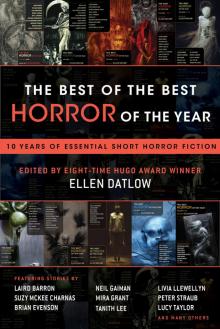 The Best of the Best Horror of the Year
The Best of the Best Horror of the Year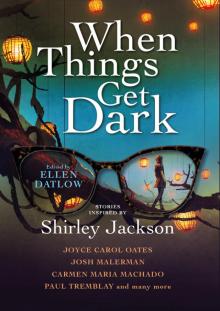 When Things Get Dark
When Things Get Dark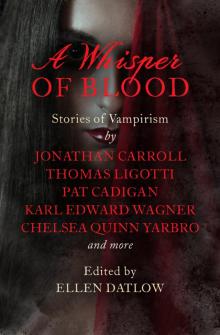 A Whisper of Blood
A Whisper of Blood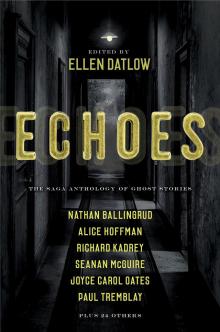 Echoes
Echoes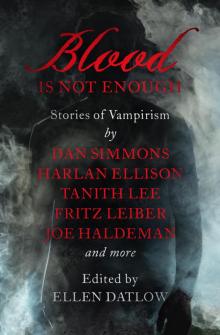 Blood Is Not Enough
Blood Is Not Enough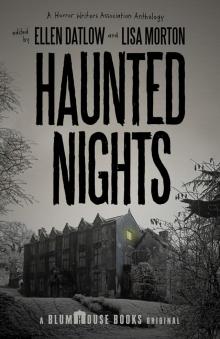 Haunted Nights
Haunted Nights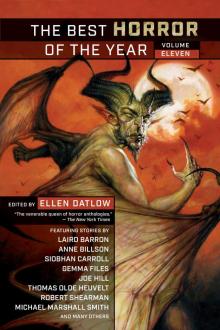 The Best Horror of the Year Volume Eleven
The Best Horror of the Year Volume Eleven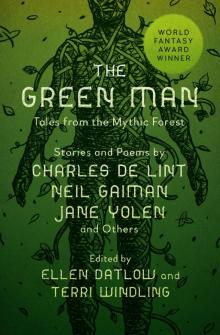 The Green Man
The Green Man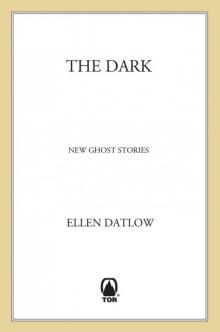 The Dark
The Dark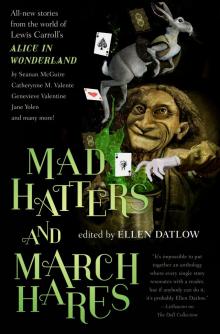 Mad Hatters and March Hares
Mad Hatters and March Hares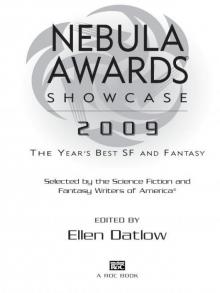 Nebula Awards Showcase 2009
Nebula Awards Showcase 2009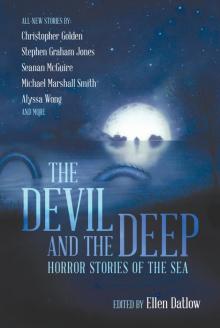 The Devil and the Deep
The Devil and the Deep